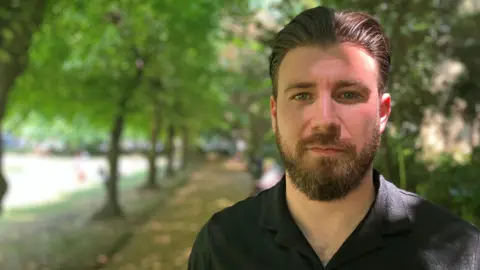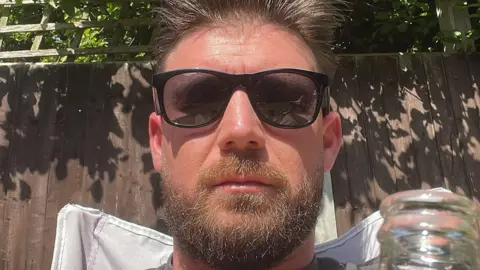ARTICLE AD BOX

 BBC
BBC
Elliott Collins spent 29 years needing regular injections to help clot his blood, now he feels cured
A transformational gene therapy that reverses the bleeding disorder haemophilia B is being made available on the NHS.
Elliott Collins was one of the first to get the treatment when he took part in the trials that proved it worked.
He says he "feels cured" and the gene therapy has given him a "new lease of life".
The treatment is one of the world's most expensive, with an official cost of £2.6m.
When you cut yourself, the body senses the injury and activates a series of clotting proteins in the bloodstream.
This makes the blood sticky at the site of the wound and then seals it with a clot.
But from the day he was born, Elliott was unable to made enough clotting factor IX (nine).
Without this crucial clotting component, bleeds are bigger and longer. Bleeds also happen spontaneously inside joints - such as the knee or elbow - causing long-term damage.
Elliott, who is 34 and from Colchester, rebelled against his diagnosis as a child by sneakily playing rugby or skateboarding.
But any injury risked a damaging bleed, like when he was tackled playing football.
"I got studs right across the shin and that came up like a cartoon, like Tom and Jerry," he said.
Elliott needed injections of factor IX twice a week - and more if he was injured - for 29 years.
"I would have to think about it all the time," he said.

 Elliott Collins
Elliott Collins
Elliott Collins is one of a handful of people to have been treated with the gene therapy during the clinical trials
But he took part in trials of the gene therapy when it was still just an experimental idea in 2019.
Since then, he has not needed any factor IX injections and says it has transformed his life.
He told me: "I don't think you can go through something like that for 29 years, for it to completely disappear and not change someone mentally and physically.
"I feel cured."
He knew it was working when he clattered his knee into a cupboard. He whacked it hard enough to balloon up and need a factor IX injection, but instead he watched as only a small mark appeared.
"That solidified [the realisation] this is real, this is working and I can relax a bit."
Tests showed that levels of factor IX in Elliott's blood had gone from nothing to 60% of normal.
How it works

 Getty Images
Getty Images
The gene therapy uses a virus to "infect" Elliott's liver with DNA containing the ability to make factor IX
Elliot was born with a mutation in his DNA - his genetic code - that meant his body's instructions for making factor IX were faulty.
So doctors gave him engineered viruses that contained copies of the fully functional factor IX instructions.
The viruses act like a fleet of microscopic postmen, delivering those blueprints to the liver.
The organ is then able to manufacture the clotting protein.
It was a one-off infusion, lasting about an hour, that Elliott is benefiting from five years later.
Not everybody will have as good a response as Elliott. In trials on 54 men, two still needed to take factor IX injections.
And nobody knows how long it will last - some trials have suggested more than a decade.
"I'm very aware of the fact that this is new, I'm almost preparing myself for it to potentially wear off to avoid any kind of major disappointment," Elliott says.
How can the NHS afford it?
Uncertainty over how long patients benefit makes it hard to know whether the gene therapy is worth the money.
Normal clotting factor injections cost between £150,000 and £200,000 per patient per year for life.
But the gene therapy - branded Hemgenix - has an official list price of £2.6m.
Elliott says it's "wild to think that’s how much it costs" and now he had multi-million pound blood he should "probably get life insurance".
The treatment is being made available through a deal between the company CSL Behring, NHS England and the National Institute of Health and Care Excellence, the body that rules on cost-effectiveness.
I have pressed all the parties involved for details of the deal, but it is bound up in confidentiality agreements.
As I understand it, the NHS will track how much patients benefit for more than a decade and that will dictate how much CSL Behring are paid. If factor IX levels dip earlier than expected, then the NHS will pay less. It is essentially performance-related pay for drugs and it is the first such deal the NHS has agreed.
The therapy will be available immediately at eight centres - Oxford, Manchester, Leeds, Bristol, Birmingham, Cambridge and two in London.
Around 2,000 people in the UK have haemophilia B and the NHS anticipates treating 250 of them.
Not everyone will be suitable for the gene therapy as some are too young or have other health conditions that rule them out.
Prof Sir Stephen Powis, the NHS national medical director, said the "transformative" gene therapy could be "truly life-changing" and had been secured "at an affordable price".
'Real milestone'
Haemophilia runs in families.
Elliott's younger brother was six days old when he died of a brain bleed. His great-uncle died from the condition at the age of 14.
Those with haemophilia, mostly but not exclusively men, pass the affected genes onto their daughters who become carriers.
This therapy will not change that genetic inheritance so it is not considered a true "cure".
But Kate Burt, chief executive of the Haemophilia Society, said it was a "real milestone".
"It is life-transforming at its most effective, it can last for decades and put the bleeding disorder into complete remission."
Similar gene therapies are being developed for haemophilia A, which is more common and affects nearly 9,000 people in the UK.
Follow James on X.
BBC Action Line: If you have been affected by issues in this story, find our what support is available here.

 11 months ago
60
11 months ago
60








 English (US) ·
English (US) ·